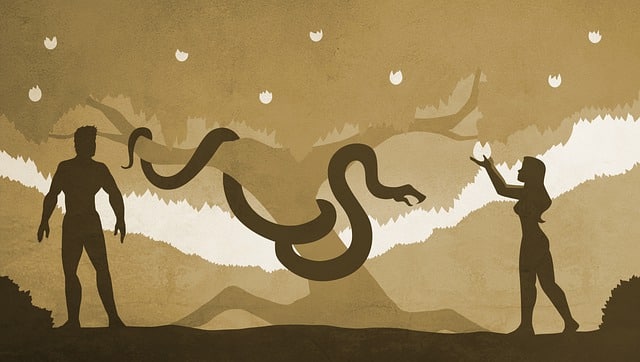
For Catholicism, humanity began with Adam and Eve
An anthropogony is a religious or mythological story about the origin of the human being . The term can also refer to the beginnings of a culture .
Related concepts
There are anthropogonies common to various peoples and others that are more specific. The main monotheistic religions, for example, present similar anthropogonies.
It should be noted that, just as anthropogony refers to the origin of man, cosmogony refers to the mythical beginnings of the world, while theogony is linked to the emergence of the gods.
Adam and Eve
Catholic anthropogony , to mention one case, indicates that Adam was the first man created by God , who took dust and made it in his likeness. Then, from a rib that he took from Adam , God created the first woman: Eve .
Although we currently do not take this story literally, it helps us understand the foundations of the Catholic religion, and can help us contextualize other of its pillars. Firstly, we have the fact that Adam was the first to be created, without leaving aside the fact that God made him in his own image and likeness, a fact that makes clear to us the preponderance of the male sex for Catholicism .
Added to this is the fact that Eve needed a rib from Adam to exist: not only was she not God's first creation, but she depended on man, although a small part of him was enough as the "main ingredient." Leaving aside the personal opinions that such a story may provoke, the use of the rib indicates a predestined and unbreakable union : according to the Bible, man and woman were created for each other , and must be together.
Pangu and chaos
In Chinese culture, anthropogony mentions Pangu , the first human being to emerge from a cosmic egg . Pangu was the one who, with a gigantic ax, separated the yin (the Earth ) from the yang (the sky ).
Pangu's anthropogony is framed in the Chinese vision according to which creation took place from chaos , which differs from that which mentions a primordial element and that which suggests the existence of nothingness before Heaven and Earth. According to the text titled Tianwen , belonging to the 4th century BC. C., before creation chaos reigned, and the emergence of the world was spontaneous.
Greek myths
Ancient Greece , meanwhile, had several anthropogonies. In the myth of Prometheus and Pandora , the first man was created by the titan Prometheus with clay, with the intention of generating a creature capable of having a spirit . The goddess Athena , in this setting, was in charge of giving it life when it was made by Prometheus .
On the other hand, we must talk about Pelasgus , the first man according to another Greek myth, who emerged from the earth itself and enlightened those who followed him with a series of fundamental knowledge for subsistence, such as the construction of houses, the collection of food and clothing making.

The myth of the titan Prometheus belongs to Greek anthropogony
In the so-called myth of the five races or ages , on the other hand, several men were born simultaneously from the Earth , as fruits and as subjects of Cronus . These men constituted the golden race , which disappeared. Then came the men of the silver race , the first bronze race , the second bronze race and the iron race .
It is important to understand that these stages were recounted both by the Greek poet Hesiod , who many consider the first of the philosophers, and several centuries later by Publius Ovid Nasón , a Roman author. The first was born around 700 BC. C., and Ovid in the year 43 BC. c.
